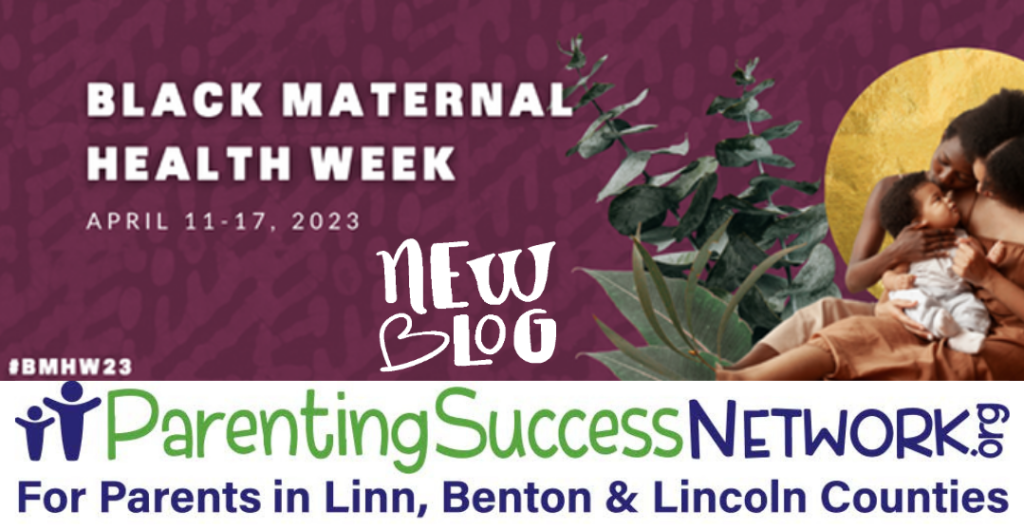It’s Black Maternal Health Week
 April 11th is the beginning of Black Maternal Health Week (#BMHW23), a week-long campaign founded and led by the Black Mamas Matter Alliance.
April 11th is the beginning of Black Maternal Health Week (#BMHW23), a week-long campaign founded and led by the Black Mamas Matter Alliance.
Designed to build awareness, activism, and community-building to amplify the voices, perspectives, and lived experiences of Black Mamas and birthing people, Black Maternal Health Week is intentionally held during National Minority Health Month.
This year’s theme, Our Bodies Belong to Us: Restoring Black Autonomy and Joy, is aimed at increasing awareness, building community, and encouraging action-taking that leads to research and policy changes.
Black Maternal Health Week begins April 11th and joins dozens of global organizations in marking this day as International Day for Maternal Health and Rights and providing an opportunity to advocate for eliminating maternal mortality globally.
Blackmamasmatter.org provides these key statistics from the Centers for Disease Control pertaining to Black Maternal Health:
- According to the Centers for Disease Control and Prevention, approximately 700 women die each year in the United States due to pregnancy or delivery complications. Almost two-thirds of pregnancy-related deaths are preventable. In 2020, Black women were most disproportionately affected with a mortality rate of 55.3 deaths per 100,000 live births, compared to 19.1 deaths per 100,000 live births, and 18.2 deaths per 100,000 live births for White and Hispanic women, respectively.
- In 2020, the maternal mortality rate for Black women was 3 times the rate for White women in the United States. Multiple factors contribute to these disparities, such as lower quality healthcare, structural racism, implicit bias from healthcare providers, and underlying chronic conditions.
- The U.S. had an infant mortality rate of 5.4 per 1000 live births in 2020, with a health disparity among Black babies at a rate of 10.6 deaths per 1,000 live births in 2019.
- Black mothers are more likely to suffer from PMADs (Perinatal Mood and Anxiety Disorders) like postpartum depression in silence and without clinical help.
- About 74% of Black infants are ever breastfed compared to more than 85% of White and 83% of Latinx moms.
- Among all infants, in 2019, Black infants had a significantly lower rate of exclusive breastfeeding at age 3 months (36.3%) than did White infants (49%); at age 6 months, the rates of any breastfeeding were 44% among Black infants and 59.9.% among White infants.
Unsupportive work policies (including lack of parental leave), unsupportive hospital policies and practices, lack of lactation support (including apathy from providers), issues with latching, lack of family support, and cultural norms are factors that contribute to breastfeeding disparities.
Hospitals in areas with higher percentages of Black residents were less likely to provide recommended maternity care practices supportive of breastfeeding. (Source: CDC)
Make a Difference in the Lives of Black Mamas
Black Maternal Health Week is designed to bring awareness to these disparities and work toward eliminating the factors that cause these differences. Some national organizations are working to make a difference in the lives of Black Mamas. Some of these include:
Shades of Blue Project, Center for Black Women’s Wellness
Perinatal Health Equity Initiative
Black Mothers’ Breastfeeding Association
National Birth Equity Collaborative
Locally, the Linn-Benton Chapter of the NAACP works to ensure the political, educational, social, and economic equality of rights of all persons and to eliminate race-based discrimination.
Samaritan Health Services offers programs and coaching in support of people of color, including the parenting series Effective Black Parenting. This class teaches parenting skills from the history and perspective of African American culture. Skills are taught through African proverbs to show the relationship of parenting skills through the view and wisdom of African ancestors. To register, call Pollywog at 541-917-4884, or register here: Effective Black Parenting Registration.
Samaritan also offers one-on-one coaching to support Black and African American families, including families raising, adopting, or fostering Black children and children of African descent. To sign up or get more information, call Pollywog at 541-917-4884.
Join us in supporting Black Maternal Health. On social media, follow and use hashtags #BMHW23 and #BlackMaternalHealthWeek to show your support.